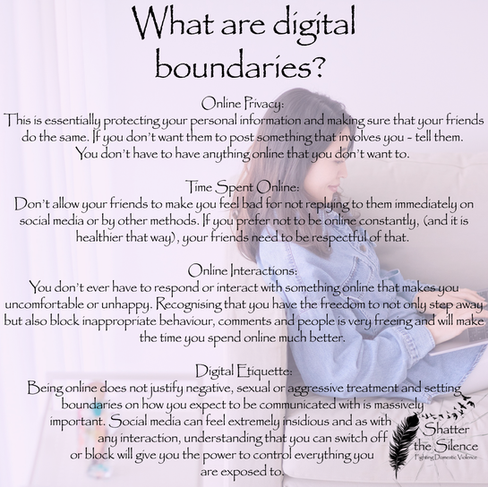Boundaries 101: A Teen Guide to Protecting Your Space and Wellbeing
- Shatter the Silence North East
- Oct 4
- 4 min read

Boundaries - something as adults we are all more than familiar with but unfortunately, the majority of us do not do well.
Teaching our children the importance of setting healthy boundaries is vital and should be something that we start from a very young age. Unfortunately, as a teen it can feel more important to be part of the group than it is to protect your mental health. Setting boundaries you are comfortable with can feel like an impossible task.
Understanding the importance of boundaries and how they tie in with consent is the first step to ensuring that you have healthy relationships that not only command respect for you, but also ensure you are respectful of others.
We have only covered a handful of things there and will come back to sexual boundaries, but as you can already see - there are a lot of things to consider when it comes to setting boundaries that will leave you comfortable and happy.
The thing to remember is that setting boundaries is not about shutting people out. Its about creating healthy relationships that allow you to be comfortable. If you are feeling drained, unhappy, resentful or dreading seeing someone, then its important to look at why. Boundaries are there to protect your peace and that is vital to your mental, physical and emotional wellness.
Creating a boundary can be difficult, especially as you begin to head into your teenage years. There is a real need to be liked and sometimes we ignore our boundaries because we worry that saying no will upset the people we want to like us. After all, as a teenager - standing out and being different to everyone else can be really hard but the one thing to hold on to when these things feel difficult is this:
The most important relationship you will ever have is the one that you have with yourself.
You need to be able to love yourself to be able to love others and that starts with respecting yourself, your beliefs and your feelings. Not everyone is part of your tribe. Guess what - that is okay.
Creating those boundaries starts with understanding you.
Who you are, what is important to you - your core values and beliefs.

Our values begin with our parents as young children, but as you grow and begin to discover yourself, those values may change or develop.
Its important that your boundaries are chosen to reflect you.
Not your upbringing. Not your friends. Not your external influences.
They are a reflection of who you are and if you are unable to show yourself and your boundaries respect, you will very quickly find that there are those around you who won't be respectful of you either.
When it comes to enforcing your boundaries, you don't need to be aggressive and you should never feel that you have to explain your reasons for them.
Using "I" statements reinforces that the boundary is your choice and not somebody elses. For example:
"I don't feel comfortable with that."
"I don't want to be part of that."
"I need some time to myself tonight. We will catch up soon."
Remember - consistency is key when it comes to boundaries. This helps massively to reinforce what you will and will not be part of.
Moving the goalposts causes confusion not just for you but for your friends and family.
Stick to your boundaries and it should help avoid pushback or guilt trips with them.
People are more likely to push back if they don't believe that you are serious and this can lead you into situations that can cause massive harm.
Unless you are certain of something, be strong and continue to do what makes you feel comfortable.
When you do get pushback, and it will happen regardless of how many times you might say no - remind them firmly that the answer is no and if they continue to push, you will walk away.
Using pushback and guilt as a way of getting someone to do something they would otherwise avoid is a common manipulation tool. If you have a friend or romantic partner doing this, its important to begin to pull yourself away from them.
This is abuse and will continue to happen if you allow it.
Those people who truly love and respect you will always respect your boundaries.
They may not agree with you on them, as is their right, but they will always respect them and you for sticking to them.
Of course, this doesn't just go one way.
Healthy relationships are all about respect.
Establishing boundaries on both sides allows both people to be themselves in the most honest and open way they can.
It's important that you are not just listened to, but that you listen.
It's important that when you say no, it is heard, but also when someone else says - you hear it.
Its important that you speak with your friends and family about the signs that your boundaries are being crossed, and that you also understand what to look for if you are going too far.
Consent and boundaries work hand in hand and without them, your relationships will not be healthy ones.
They not only show respect for others, but for yourself and that is vital in establishing what behaviours you will allow in your life.
Start small.
It doesn't have to be something massive.
Just one healthy boundary put in place will make a huge difference and help you to grow the confidence to add more as you need to.
Your boundaries are your voice and your voice matters!
Check out the boundaries quiz on our resource page, along with some tips on how to create healthier boundaries.
Remember - boundaries aren’t about being mean or selfish — they’re about taking care of yourself so you can show up as your best self in friendships, family, and relationships.











Comments